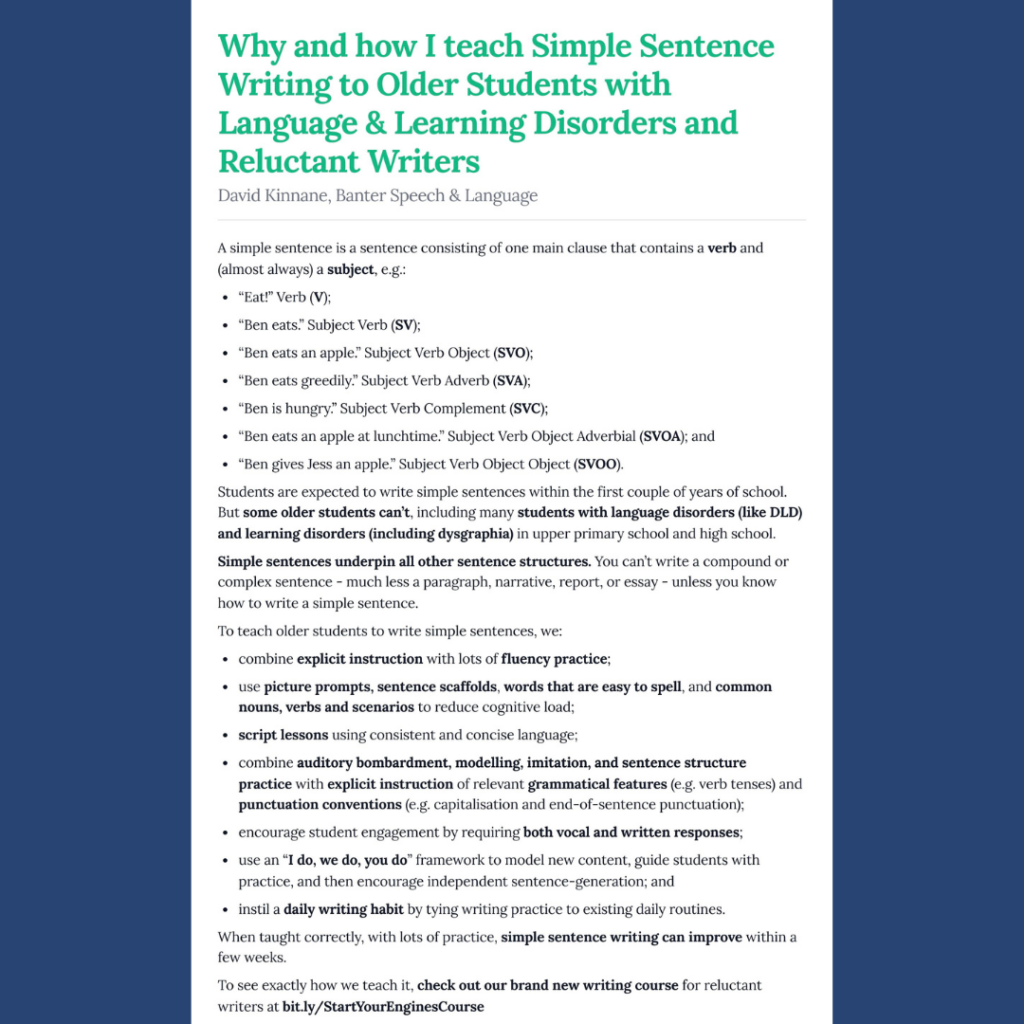A simple sentence is a sentence consisting of one main clause that contains a verb and (almost always) a subject, e.g.:
- “Eat!” Verb (V);
- “Ben eats.” Subject Verb (SV);
- “Ben eats an apple.” Subject Verb Object (SVO);
- “Ben eats greedily.” Subject Verb Adverb (SVA);
- “Ben is hungry.” Subject Verb Complement (SVC);
- “Ben eats an apple at lunchtime.” Subject Verb Object Adverbial (SVOA); and
- “Ben gives Jess an apple.” Subject Verb Object Object (SVOO).
Students are expected to write simple sentences within the first couple of years of school. But some older students can’t, including many students with language disorders (like DLD) and learning disorders (including dysgraphia) in upper primary school and high school.
Simple sentences underpin all other sentence structures. You can’t write a compound or complex sentence – much less a paragraph, narrative, report, or essay – unless you know how to write a simple sentence.
To teach older students to write simple sentences, we:
- combine explicit instruction with lots of fluency practice;
- use picture prompts, sentence scaffolds, words that are easy to spell, and common nouns, verbs and scenarios to reduce cognitive load;
- script lessons using consistent and concise language;
- combine auditory bombardment, modelling, imitation, and sentence structure practice with explicit instruction of relevant grammatical features (e.g. verb tenses) and punctuation conventions (e.g. capitalisation and end-of-sentence punctuation);
- encourage student engagement by requiring both vocal and written responses.
- use an “I do, we do, you do” framework to model new content, guide students with practice, and then encourage independent sentence-generation; and
- instil a daily writing habit by typing writing practice to existing daily routines.
When taught correctly, with lots of practice, simple sentence writing can improve within a few weeks.
To see exactly how we teach it, check out our brand new writing course for reluctant writers here.

Related free resources and reading:
Is your child or teenager a Reluctant Writer?
How to create a daily writing habit with a dedicated nook | Banter Speech & Language
Don’t skimp on complex sentence work when teaching students to listen, speak, read, and write
Teaching students about text types won’t – on its own – make them good writers
11 ways to improve writing interventions for struggling students
Why should I learn to write when I can just use ChatGPT and Grammarly?
Help primary school students learn to write with sentence-combining practice
Recommended further reading & research:
Datchuk, S.M., Zimmerman, L.M., Wagner, K., Poch, A.L. (2022). Five Steps to Teach Simple Sentence Writing to Students with Learning Disabilities. Teaching Exceptional Children. https://journals.sagepub.com/doi/abs/10.1177/00400599221120063?journalCode=tcxa
Graham, S. Collins, A.A., and Rigby-Wills H. (2016). Writing characteristics of students with learning disabilities and typically achieving peers: A meta-analysis. Exceptional Children, 83(2) 199-218. Writing Characteristics of Students With Learning Disabilities and Typically Achieving Peers: A Meta-Analysis

Hi there, I’m David Kinnane.
Principal Speech Pathologist, Banter Speech & Language
Our talented team of certified practising speech pathologists provide unhurried, personalised and evidence-based speech pathology care to children and adults in the Inner West of Sydney and beyond, both in our clinic and via telehealth.


Leave a Reply